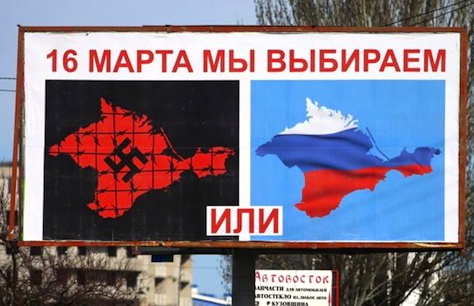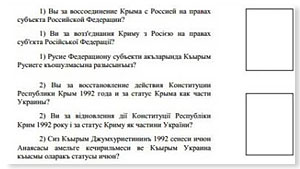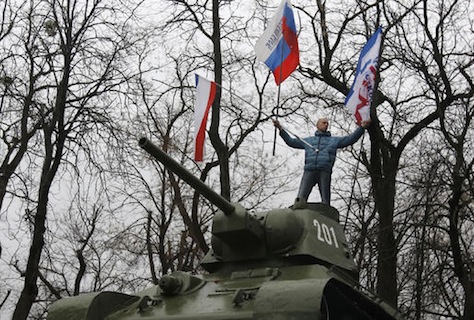The billboard above announces Sunday’s hastily coordinated referendum, presenting the choice for Crimea as between joining the Russian federation or a future of, apparently, Nazism run amok.![]()
![]()
![]()
The March 16 vote comes barely three weeks after Russian troops essentially took control of the peninsula.
The Crimean crisis, and the wider Ukrainian crisis, have been widely discussed throughout the international media, so there aren’t too many original points I can make about Sunday’s vote.
The most obvious, perhaps, is that no one expects Crimea’s election to be either free or fair, in any normal sense of those words. Though self-determination is one element from which nation-states today derive legitimacy, consider the context of the Crimean referendum with the context of September’s referendum on Scottish independence — the referendum date was settled more than a year in advance, the terms agreed by both UK prime minister David Cameron and Scottish first minister Alex Salmond, the debate focusing on the economic and other policy implications of independence.
It’s also important to remember that Crimea, ultimately, remains a sideshow. The more compelling story about Ukraine today is that its acting government is working, largely with success, to bring calm to the rest of the country. US and European financial support is likely to shore up Kiev’s shaky finances, preventing Ukraine’s pending sovereign default, and a May 25 presidential election could restore some semblance of political stability after the fall of corrupt president Viktor Yanukovych on February 22 (though that won’t end the cultural and economic imbalances that have caused such a strong east-west divide in Ukraine).
A phony choice?
Crimea’s referendum will be a slapdash affair meant to rubber-stamp the newly constituted Crimean parliament’s decision to seek Russian annexation. That’s clear from the tilted nature of the referendum’s wording. Crimeans will choose between two options, worded in Russian, Ukrainian and Tatar:
1. Do you support Crimea joining the Russian Federation as a federal subject?
2. Do you support restoration of the 1992 Crimean constitution and Crimea’s status as a part of Ukraine?
The second option, as many scholars have written, is needlessly complicated, because there’s some doubt over which version of the 1992 Crimean constitution that the referendum option references. The original version states that Crimea is an independent state; only later was the constitution revised for Crimea’s current status, an autonomous republic within Ukraine. So there’s some suspicion that if Crimeans support the second option, it’s a vote for Crimean ‘independence’ from Ukraine that would, in essence, still bring Crimea under Russian control. Continue reading Crimea prepares to ‘vote’ in status referendum


